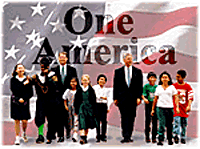 |
 |
|
The Illinois Ethnic Coalition (IEC) was created in 1971 in response to the Kerner Commission Report, which said that the United States was becoming two nations: "black, white, separate and unequal." The IEC sought to bring together Chicago's white ethnic, African American, Asian and Latino communities to work together on projects of common concern. Throughout the 1970s and 1980s IEC worked with Chicago's ethnic leaders on a variety of issues, including multicultural education, civil rights advocacy, protesting apartheid in South Africa, hate crimes, immigration, legislative redistricting, census awareness, media awareness of ethnic communities, reparations for World War II internment and hate crimes.
IEC works collaboratively with many mainstream and ethnic institutions to advise them on ways to more effectively reach out to Chicago's diverse communities. For example, IEC has coordinated community tours for The Chicago Tribune and regularly supplies journalists with background information, story ideas and spokespeople. IEC also designs projects specifically to promote better intergroup relations. One such project brought Korean and African American youth together to perform in DanceAfrica/Chicago, the nation's largest celebration of African American dance. IEC has also coordinated and facilitated workshops to promote better race relations between Latino and African American parents active in Chicago's public schools. Finally, IEC regularly holds interactive forums or "town hall" meetings on issues affecting ethnic groups. Recent forums have focused on topics concerning racial identity in the 21st Century, such as immigration, intermarriage, "whiteness," and the creation of the multiracial category on the census.
Outcomes and Significant Accomplishments In 1995, IEC began compiling a database of Chicago's ethnic organizations. To date, this database has been distributed to more than 1,500 businesses, nonprofits, schools and public institutions. In 1996, IEC released a handbook that contains detailed profiles on 33 of the city's major ethnic groups, supplying information about immigration and migration history, census demographics, customs and traditions, religions, languages and political participation. In early 1998, IEC published another resource guide that comprised a compendium of ethnic organizations, ethnic media, foreign consulates, scholars who specialize in ethnic studies and a calendar of ethnic holidays.
|
![]()
To comment on this service,
send feedback to the Web Development Team.
![[White House icon]](/New/images/home_pin.gif)
![[Help Desk icon]](/New/images/help_pin.gif)